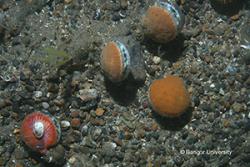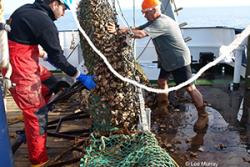�鶹�� assists Isle of Man government to understand economically vital fisheries
Work that is leading to a better understanding of important sea fisheries off the Isle of Man is set to continue following the re-appointment of �鶹�� as external scientific adviser to the Government’s (DEFA).
 Queen scallops on the seabed in the Isle of Man.
Queen scallops on the seabed in the Isle of Man.
Sea fisheries are worth £12 million a year to the Island’s economy, with the product exported all over the world.
�鶹�� was first appointed to advise the Department of Environment, Food and Agriculture (DEFA) in 2007. The University’s current contact, which ends in August 2015, has been reappointed for a further five years following a tendering exercise.
According to the Isle of Man government, the scientific advice provided by �鶹��, is leading to a better understanding of sea fisheries. Karen McHarg, Director of Fisheries with DEFA, said �鶹�� scientists conduct the detailed queen scallop stock assessment and collect data for all the major commercial species, including scallop, crab and lobster.
The University advises the Manx Fish Producers’ Organisation and the Queen Scallop Management Board – a body that has membership from all the Irish Sea fishing jurisdictions.
Karen said: ‘Two �鶹�� scientists are based at DEFA, working closely with officers and the fishing community, and this has worked well to integrate the science, Government and industry working relationship.
 Emptying a scallop dredge on the RV Prince Madog.‘The priorities are continuing with queen scallop stock assessment work, developing a stock assessment for king scallops and working with industry on local crab, lobster and whelk populations.’
Emptying a scallop dredge on the RV Prince Madog.‘The priorities are continuing with queen scallop stock assessment work, developing a stock assessment for king scallops and working with industry on local crab, lobster and whelk populations.’
Richard Ronan MHK, Minister for Environment, Food and Agriculture, said: ‘The Department will continue to work in collaboration with �鶹�� and the Science Steering Group, a body established last year on the recommendation of the Queen Scallop Management Board.
‘It is important going forward in managing our sea fisheries that all the stakeholders are involved in this process, scientists and industry alike. The Isle of Man does not receive EU funding like its neighbouring jurisdictions and yet is determined to progress and manage sustainable fisheries into the future.’
Speaking on behalf of �鶹��, Professor Mike Kaiser of the said:
“We have a strong focus on working with the fisheries industry and representative bodies. Our participatory approach aims to include and consider the needs of all the stakeholders as well as the environmental needs, to reach a sustainable plan that is acceptable to all. We’re delighted that this work with colleagues in the Isle of Man is to continue.”
Publication date: 23 June 2015
